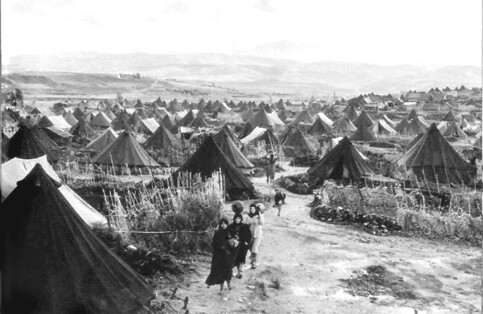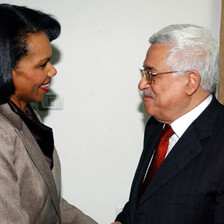The Electronic Intifada 10 May 2005

(Photo: UNRWA)
At this very moment in the Arab world, Europe, and further afield, Palestinians from all walks of life have been gathering together in large and small meetings to discuss the issues that concern them, in open debate. They choose the things they wish to speak about, and raise the issues that concern them. They discuss how to advance their rights - and there are certainly a multitude of them - legal, economic, civic, political, and social.
The Civitas project, based at Oxford University and facilitated by a team of just three Palestinians based there, is helping to establish how Palestinian refugee communities living in exile in the Middle East, Europe and further afield can have better channels of communication with their national representative the PLO and its institutions, the host country where they currently reside, the humanitarian agencies that serve them, and ways to connect to other refugee communities, both inside and outside of Palestine. In this way Palestinians can strengthen themselves, and reconnect to the institutions that serve them, and mobilise for their rights. Each refugee community has taken it upon themselves to run their own needs-assessment where they determine which mechanisms they might need - for example by strengthening existing structures such as unions and associations, by regular newsletters, delegations, monthly meetings, education committees, and other means of communication.
This project is based upon the right of Palestinians everywhere, both inside and outside of Palestine, to participate together in the struggle for achieving these rights. In Sweden, in Germany, in Yemen, in Lebanon, in Greece, in Iraq, in Spain, this basic right to participate is something the Palestinian people insist upon - the right to speak for themselves, the right to struggle for their rights and not to wait for them. This follows a long tradition of political struggle and activism directed from the ground up, and it is this right that has sustained the Palestinian people for so many generations. No leaders, no government (in the Arab world or in the West), can deny the power of this energy and commitment, nor its legitimacy. The people speak for themselves.
The results have been extraordinary, and quite unprecedented. Run by local activists and grass-roots associations on a volunteer basis in each of these refugee and exile communities, the meetings have demonstrated a key reality that is often ignored and misunderstood, both in the Arab world and in the West. The Palestinian body politic is alive and united on a variety of central concerns, and has not been fragmented or destroyed in spite of more than 10 years of concerted attempts to do so.
The early findings from the debates also demonstrate the centrality of certain issues- the first is that the PLO is the sole legitimate representative of the Palestinian people wherever they are. This declaration of representation and popular sovereignty does not coming from the leadership - it comes from the people themselves, and is a confirmation of the utmost significance. Although the PLO has facilitated some meetings in a number of countries through their embassies, it is not run or organised by the PLO, but by local community activists. Palestinian political life is still made up of the traditional democratic mechanisms - parties, factions, unions and associations of all kinds. Although the political parties and factions have supported the objectives of the project from its inception, it is the local associations on the ground that convene, invite, and involve their own community to attend these public debates, so that everyone can speak for themselves, and no-one can speak on their behalf.
The other key concern that emerges is the centrality of the right of return. Whatever the differences in living conditions and civil status’ of the refugee and exile communities in various host countries, this common understanding is evoked time and time again. Whether in Vlaartegan in Holland or Rashidyeh camp in South Lebanon, this issue is one of the first to be raised, demonstrating that it is the essence of Palestinian political identity, and a central unifying factor, rather than an issue that divides Palestinians.
The debates and workshops are taking place in dozens of cities in over 25 countries across the Middle East, Europe, North and Latin America. They follow different models according to the local geographic, social, and political constraints. Active members of Palestinian refugee communities have the responsibility to reach out to the different sectors of their community so the debates can be as inclusive and popular as possible. During the debates care is taken to ensure that the ideas and suggestions of the participants are noted down in detail and are also recorded on audio and sometimes also video cassettes, so as to guarantee that their voices and views are accurately recorded.
In Denmark meetings have been held in the different towns where there are sizeable Palestinian refugee communities. Similarly, such meetings have taken place throughout Sweden in the cities of Malmo, Uppsala and Stockholm, and are set to take place in other towns in May. In Berlin, and Frankfurt, Germany, where the largest Palestinian communities in Europe is to be found, meetings have begun, and larger ones will take place in the major towns this month and next. In Holland on Land Day, a large public meeting was convened, and a series of smaller meetings follow this month. In Athens and Thessalonika in Greece, in Barcelona, Madrid, and the United Kingdom in the coming days, in Canada and America next month, Palestinians are finding ways to ensure Palestinians everywhere can have the possibility to participate in the issues that concern them, at the same time.
An extensive series of meetings have been held all over Lebanon.. Volunteer teams working on the project have organised meetings in the key regions, ensuring participation of different sectors of the Palestinian refugee community and a large attendance. The meetings began with public as well as syndicate meetings of workers, youth and students, and women for the Tyre region: a public meeting in the El-Rashidiyeh refugee camp was followed by a syndicate meetings in Bourj El Shamali, El-Rashidiyeh, and El-Bass refugee camp. An open public meeting in Bourj El Barajneh refugee camp initiated syndicate meetings that have taken place in the Beirut area, including Shatila and Mar Elias. Additionally, an opening public meeting was held for the north area of Tripoli, where more than 400 Palestinians from the refugee camps of Nahr El Bared, El-Baddawi, and the surrounding areas attended, many arriving in buses in order to actively participate in the meeting which lasted for several hours, and were followed that next week by syndicate meetings.
Participation has been impressive and diverse, varying in attendance from 20 up to 400 people, depending on the form of the meeting, the size of the community in the region in question, and the capacity of local organizers to reach out to the community at large. Many of the new generation are participating in the debates and expressing their concerns, and in many areas these meetings are the first time they had come together for many years, if at all. Suggestions and ideas brought forth during the meetings so far have been creative and rich, both in their content and their quantity. Ideas range from enhancing existing civic structures; practical issues such as obtaining Palestinian I.D. papers for local refugee communities in Europe as a way to both prove and protect Palestinian identity; twinning programs and network-building between Palestinian refugee communities around the world; radio stations and web-sites; maintaining and updating registration with UNRWA if they are currently residing outside UNRWA mandate areas; organizing delegations and committees to voice concerns with all relevant bodies: the PLO, international humanitarian agencies such as UNRWA and the UNHCR. The refugees express the view that improving their political, economic, social and legal conditions will empower them, give them better chances to participate effectively in decisions relating to their future, and will help them better argue for, and obtain, their rights. More ideas and recommendations are coming in daily as the debates unfold.
Most encouraging for the Palestinian refugees, isolated and ignored by the international community, is that they are learning about other refugee communities across the world. There is a common hunger to learn about the situation of Palestinians everywhere, from Iraq to Chile, to el Bass, to Sweden, about which they now know little. They are discovering common concerns, common quests, common hopes and dreams. Young Palestinians all over the world are learning about their common history and the present reality of Palestinian refugees, forging new friends and alliances, and taking forward this cause into the coming years. This is our strength and our hope.
Dr Karma Nabulsi is a Research Fellow at Nuffield College, lectures at Oxford University, and was formerly a PLO representative. For more information about the Civitas project, see www.civitas-online.org
Related Links



